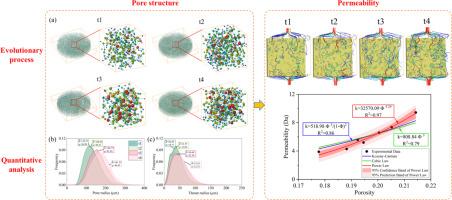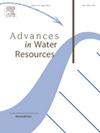Effects of geochemical reactions on flow properties during compressed air energy storage in aquifer
IF 4.2
2区 环境科学与生态学
Q1 WATER RESOURCES
引用次数: 0
Abstract
Reservoir flow properties are crucial for sustaining the magnitude and effectiveness of compressed gas energy storage in aquifer. Although changes in flow properties due to CO2 injection have received attention, the impact of compressed air injection-induced geochemical reactions on flow properties has been overlooked. This study presents a series of controlled experiments with different reaction conditions to reveal the effects of pore-scale mechanisms of geochemical reactions on pore structure and flow properties. Although air injection enhanced the oxidation potential of the brine, oxidation reactions were limited due to the absence of oxidation-sensitive minerals. Integrated analyses of fluid chemistry, mineralogical characterization, and kinetic reaction modeling indicated that albite dissolution was the primary process governing rock property alteration. Albite dissolution occurring in pores and throats drives pore structure evolution and interconnects isolated pores, thereby leading to a significant increase in the total and connected porosity. As a result, an increase in permeability was observed. The brine percolating through the larger pores initiates the albite dissolution, further widens the seepage pathways and enhances the fluid flow. Ultimately, a quantitative relationship between permeability and porosity influenced by geochemical reactions was established. This study highlights the significance of geochemical reactions in compressed air energy storage in aquifer and provides essential theoretical insights for future numerical simulations and commercial exploitation.

地球化学反应对含水层压缩空气蓄能流动特性的影响
储层流动特性对维持含水层压缩气体蓄能的规模和有效性至关重要。虽然CO2注入引起的流动特性的变化受到了关注,但压缩空气注入引起的地球化学反应对流动特性的影响却被忽视了。本研究通过一系列不同反应条件下的对照实验,揭示了地球化学反应的孔隙尺度机制对孔隙结构和流动特性的影响。虽然空气注入提高了卤水的氧化电位,但由于缺乏氧化敏感矿物,氧化反应受到限制。流体化学、矿物学表征和动力学模拟综合分析表明,钠长石溶蚀是控制岩石蚀变的主要过程。孔喉中钠长石溶蚀作用驱动孔隙结构演化,使孤立孔隙相互连通,使总孔隙度和连通孔隙度显著增加。结果,观察到渗透率的增加。盐水通过较大孔隙渗透,引起钠长石溶蚀,进一步拓宽了渗透通道,增强了流体流动。最后,建立了受地球化学反应影响的渗透率和孔隙度的定量关系。该研究突出了地球化学反应在含水层压缩空气储能中的重要性,为未来的数值模拟和商业开发提供了重要的理论见解。
本文章由计算机程序翻译,如有差异,请以英文原文为准。
求助全文
约1分钟内获得全文
求助全文
来源期刊

Advances in Water Resources
环境科学-水资源
CiteScore
9.40
自引率
6.40%
发文量
171
审稿时长
36 days
期刊介绍:
Advances in Water Resources provides a forum for the presentation of fundamental scientific advances in the understanding of water resources systems. The scope of Advances in Water Resources includes any combination of theoretical, computational, and experimental approaches used to advance fundamental understanding of surface or subsurface water resources systems or the interaction of these systems with the atmosphere, geosphere, biosphere, and human societies. Manuscripts involving case studies that do not attempt to reach broader conclusions, research on engineering design, applied hydraulics, or water quality and treatment, as well as applications of existing knowledge that do not advance fundamental understanding of hydrological processes, are not appropriate for Advances in Water Resources.
Examples of appropriate topical areas that will be considered include the following:
• Surface and subsurface hydrology
• Hydrometeorology
• Environmental fluid dynamics
• Ecohydrology and ecohydrodynamics
• Multiphase transport phenomena in porous media
• Fluid flow and species transport and reaction processes
 求助内容:
求助内容: 应助结果提醒方式:
应助结果提醒方式:


